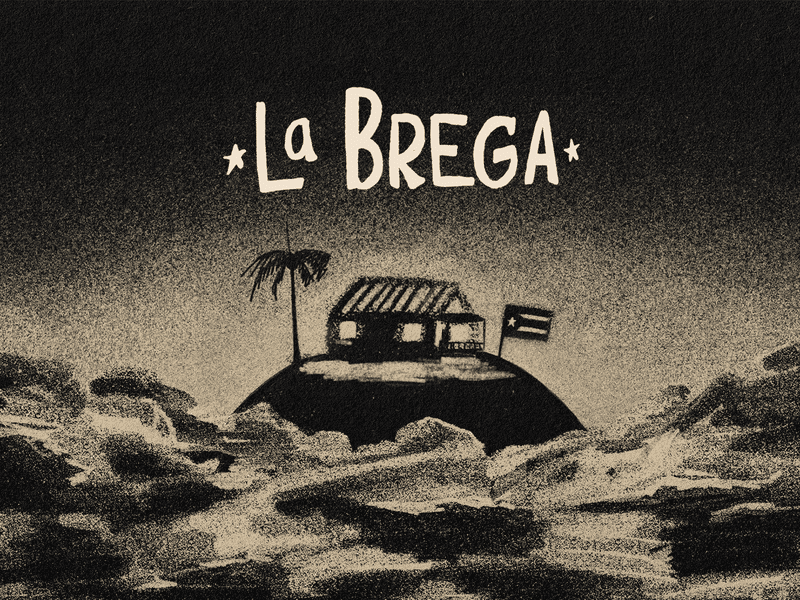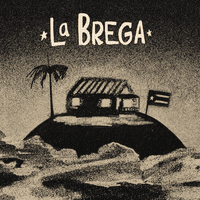1. What Is La Brega?

Alana Casanova-Burgess: A few months back, a friend sent me a photo of a water truck in a pothole in Caguas, Puerto Rico. At first, I thought it was photoshopped. The front half of the truck was up in the air, wedged in an enormous crater in the middle of the road. It looked as if the asphalt had opened a gaping mouth, and was trying to swallow the truck.
And then there were the words on the back, AGUA POTABLE -- potable water -- the A of Agua obscured by the pothole. The whole thing seemed like a metaphor for the state of things in Puerto Rico, it was a bit on the nose. And then I saw the video.
Video sound: “Estan son las cosas que pasan.”
These are the things that happen, whoever was filming said.
At the back of the truck, the water was pouring out of the hose into the depths of the hole…
It turns out that it was on its way to a neighborhood that had been without water for two weeks. And, a broken water pipe was responsible for the sinkhole.
There’s a lot happening here. A truck filled with water tried to reach a community that had been without it. Then that truck gets swallowed by a hole in the road that was caused by a broken water pipe, and lastly, as if adding insult to injury, the water in the truck was lost to the pothole.
Estas son las cosas que pasan. These are the things that happen.
CHEO SANTIAGO: We have to deal with that. [...] You have to avoid a pothole any day when you go to work, when you go to the supermarket.
Jose Angel Santiago Rios, better known as Cheo Santiago, runs the social media account Adopta Un Hoyo -- adopt a pothole. He re-posted the truck video on instagram, and we spoke over Zoom recently.
CHEO: You go anywhere, you're going to find a pothole. Trust me. Trust me, trust me. Trust me.
I can confirm, a lot of Puerto Rican roads are filled with craters. People on the island often joke about it, comparing the roads to the surface of the moon.
Ten years ago, Cheo drove over one that rattled more than his axle. It’s the reason I wanted to start this podcast with him: because if I’m going to explain to you what la brega means, what it means for Puerto Rico, I need an example. And Cheo’s brega tells the story.
Cheo used to live in Miami -- he was there for nine years, working as a plumber, driving the same car without issue for all that time. When he moved back to the island in 2009, he even had it shipped from Florida.
CHEO: And when I started using my car in Puerto Rico. In less than a year, is damaged.
Then came the pothole -- a decade later, he still remembers where it was and what it looked like.
CHEO: Cuando vengo del pueblo de Gurabo, para ir hacia San Juan…
He was going from Gurabo to San Juan...
It was a monster of a pothole —
Cheo: de ancho como unas 20 pulgadas
Maybe 20 inches wide and 6 inches deep.
Cheo: de profundidad como una seis pulgadas.
It caused damage to his front axle. He got it fixed — for a hundred bucks or so — And then he found himself a week later on the same stretch of road, passing the very same hoyo.
CHEO: I got white spray paint with me in the car and I stop the car and go walk to the pothole on the highway and I mark it with white paint. Everybody hitting the same pot hole with the same damage. You know, it's just too much money.
He posted the photos online, and Adopta Un Hoyo was born in 2011. Since then, he estimates he’s painted over a thousand potholes this way -- tracing the jagged outline of the crater, and then straight lines like sun rays coming out of it. And now other people do it too, sending him photos and addresses from across the archipelago. The idea is that the road crews will see the posts online and go to repair the holes. But in austerity-stricken Puerto Rico there’s a lot that goes unrepaired, or poorly fixed.
So the paint becomes a solution to the problem in itself, helping drivers spot and avoid los hoyos. And the potholes are dangerous!
CHEO: You can hit another car. You can lose control when you're driving.
You can lose a tire. Your entire wheel can get stuck in a crater -- there are videos of this happening.
VIDEO: Acabo de caer en uno! Mira para eso -- la goma se vació completa… aquí lo marca, aqui lo marca, lo pueden ver.
And even when an encounter with a pothole doesn’t seem TOO bad...
CHEO: Maybe you don't get an accident or any damage but in a few days, you're going to you're going to listen to a new sound in your car -- cling cling cling -- jajajaja -- starting with noise -- the car is starting with noise in a few days.
The hoyo situation in Puerto Rico is one that you kind of just have to negotiate with, or wrestle with. You can’t actually fix it, but you can cope.
CHEO: but that's the Brega in Puerto Rico.
ALANA: That’s la brega.
CHEO: That’s la brega, that’s la brega en Puerto Rico.
La brega. There’s no perfect English translation for this word that Puerto Ricans use all the time, in a way no other Spanish speakers do. Cheo says bregando is like “dealing with it.” But there are other definitions too. So, as we were in production for this episode, we asked boricuas for help describing it and got voice memos from San Juan to Queens.
MONTAGE TAPE: When I hear or use la brega, I’m referring to the struggle
The struggle // Lucha, viene del hustle.
Esta en the hustle // in the hustle. // hustle
La brega has to deal with everyday life, I call it cotidianidad.
Determinación, Sobrevivencia, Trabajo.
ALANA: Determination -- survival -- work.
MONTAGE TAPE: A way to do something in circumstances that don’t let you get ahead.
Grinding.
You know what it means, it means to do it! [laughter]
I commonly use it when someone asks me what are you up to or how are you doing? I’m cruising along.
Buscando, continuamente buscando algo.
ALANA: Searching, continually searching for something.
Showcasing our true Puerto Rican brilliance.
If you’re boricua and someone asks you how it’s going, how you’re doing, you might say, “ah, ya tu sabes -- aqui en la brega.” Here, making it work, you know, dealing with it, in the struggle.
In the last year, as we’ve been coping with this pandemic, and with so much else, I’ve used “aqui en la brega” more and more -- how else could I answer when someone asks, “how are you doing?”
There’s an imbalance of power when you’re bregando, whether it’s against your boss or some larger injustice. It’s an underdog’s word. A brega implies a challenge we can’t really solve, so you have to hustle to get around it. And in Puerto Rico, there are a lot of challenges that seem unsolvable. Puerto Ricans are constantly bregando with the jobs that don’t pay enough, the electricity that comes and goes, their kid’s schools that are closed, the broken traffic lights that never get fixed. The hospital that doesn't get built. The government’s debts that aren't paid. The frustration over status. Austerity. Colonialism.
And la brega is a word that came to the states with the diaspora, who have had to find a way to deal with a new language... to navigate somehow being immigrants and citizens at the same time... to struggle with displacement and discrimination.
But it’s not just about dealing with a problem… it can also be finding a way to fight the system, to get around it, or somehow keep moving. There’s an edge of creativity, too, it’s like an art.
Arcadio Diaz Quiñones: Some individuals are very good at bregar.
Arcadio Diaz Quiñones is a Puerto Rican writer and scholar, and professor emeritus at Princeton. He’s thought a lot about the way we use “la brega” -- peppering it into our language, even complimenting each other for struggling well.
Arcadio: It's interesting the expression “Ella brego bien”, we admire the way that she dealt with the situation because it was so difficult.
Some twenty years ago he published an influential essay called “De Como y Cuándo Bregar”. The essay used the language of la brega as a lens to understand Puerto Rican history and politics and identity -- basically, arguing that there’s something about this word that unlocks a lot about who we are.
Arcadio: I think it's so profound and so frequently used that we must go back a long, long time.
“Puerto Ricans are always en la brega, vulnerable and alert,” he wrote then. The English word he thinks comes closest is “grapple.”
Arcadio: La brega means that you have to invent, you have to use what you have, and you also have to pay attention to others. And it's not an easy chore.
In the last few years, there have been even more memorables examples of Puerto Ricans en la brega. I think often about a video I saw after Maria, of a woman in Bayamon showing off her dad’s invention:
Tape: Bueno, llevamos un mes lavando en la famosa bicilavadora…
MAN: Bicilavadora...
A washing machine with bicycle handlebars attached so you could spin it by hand, even without electricity.
Tape: Mira como lava. // Más fuerza que tu le metas, mas lavas. // Ejercicio de una vez. //Seguro .
And I think about how, after Maria, communities came together, all the networks that were formed to try and meet the needs that weren’t being met in a desperate situation. A brega colectiva.
Arcadio: They could not wait for the state to do it, or the state failed in many cases.
And this is where la brega becomes a concept that can be nauseating. Why do we take pride in negotiating, in hustling? In putting up with how things are, going with the flow? What does it say about us that we are so often pragmatic -- That’s that’s our go-to? And, above all, what does it say that we have a society, and a government, that requires us to be en la brega all the time?
Arcadio: I don't want to contribute to a sort of celebratory idea of La Brega. There are many things to celebrate, but we also have to recognize that there are failures. [...] And we have to acknowledge that pragmatism. Is helpful in some situations and not in others.
In the long, long months after Maria, when some Puerto Ricans were without power for a whole year, we heard a lot about resilience
MONTAGE:
Puerto Ricans' resilience on display.
And I see the plight of the Puerto Rican people - they’re very resilient.
Such resilience.
Tremendously resilient.
So much so, that there was a backlash against that word. It was as though Puerto Ricans were being congratulated for being able to put up with so much, even as aid and recovery was being denied.
This came up with Cheo Santiago from Adopto un hoyo, Adopt a Pothole too.
CHEO: Y yo digo nos merecemos más. ¿Me entiendes?
CHEO: No tenemos porqué estar en la brega todo el tiempo que de estar remendando en vez de hacer la reparación correcta.
We shouldn’t always have to be en la brega, patching up potholes instead of actually repairing them. And yet, he keeps painting the hoyos and posting them, because he’s hopeful that the effort helps people -- it might even save them. Think of it as an act of solidarity, of citizenship. That’s part of la brega too.
As I was producing this episode, thinking about potholes, there was actually breaking pothole news.
Former Governor Ricardo Rossello spoke to the New York Times, his first public interview since the summer of 2019, when he resigned and left the island after thousands of people protested relentlessly, demanding he leave office.
PROTEST TAPE
It was during those protests, he claimed in this new interview, that his car had hit a huge pothole. His five year old daughter thought it was a gunshot. And… he says… it was that, the pothole incident and his daughter’s reaction, that got him to resign -- not because he heard the demands of an outraged public.
Puerto Rican twitter exploded with memes of potholes protesting the former governor, or asphalt taunting him. There was one of a crater photoshopped onto Che Guevara’s face — a revolutionary pothole. Twitter was roasting Rosselló, but the memes were also pointing to the twisted irony, that the governor was panicked at something Puerto Ricans deal with everyday, and something his administration was responsible for fixing.
Arcadio has been thinking about those outraged people who went into the streets to march against the governor -- los indignados -- and what happens when people see their power.
Arcadio: Just looking at so many young people, so many and every day and so vibrant. What it meant to me was that there was a deep reserve of energy and thought and moral conviction there, no? It's there, it's there. And it was such a joy to see that it’s there. We can imagine a different plot, a different ending, no?
Alana: Yeah.
And you know, that doesn't mean we will succeed, but we can imagine, in spite of the harshness of the real, that's la brega -- collective and individual, too.
For Arcadio — that’s part of La Brega — imagining a better reality, together.
This series is an anthology about Puerto Rico — each episode opens a door to a different aspect of the Puerto Rican experience. Our brega. It’s about our history, and our present — in many ways it's about colonialism… and about what it means to be a people.
And the reason we decided to make this series is that since Hurricane Maria hit, media around the states started paying more attention to Puerto Rico. But many of the conversations centered around US politicians, or if we could or should be admitted as the 51st state of the Union. Those conversations didn’t really focus on us.
And so in this series, we start with the principle that we deserve to hear stories about ourselves and how we got here.
Which is why every episode is in two languages: so we don’t leave anyone out, either on the island or in the diaspora.
Copyright © 2021 Futuro Media Group and New York Public Radio. All rights reserved. Visit our website terms of use at www.wnyc.org for further information.
Transcripts are created on a rush deadline, often by contractors. This text may not be in its final form and may be updated or revised in the future. Accuracy and availability may vary. The authoritative record of New York Public Radio’s programming is the audio record.


